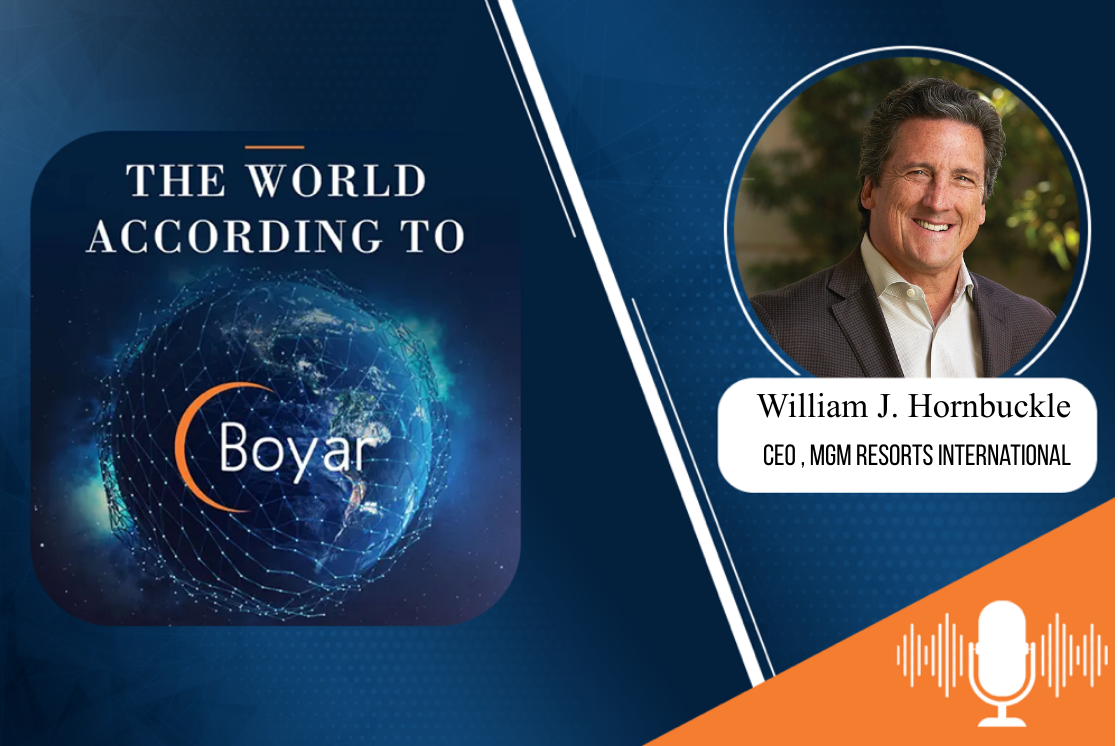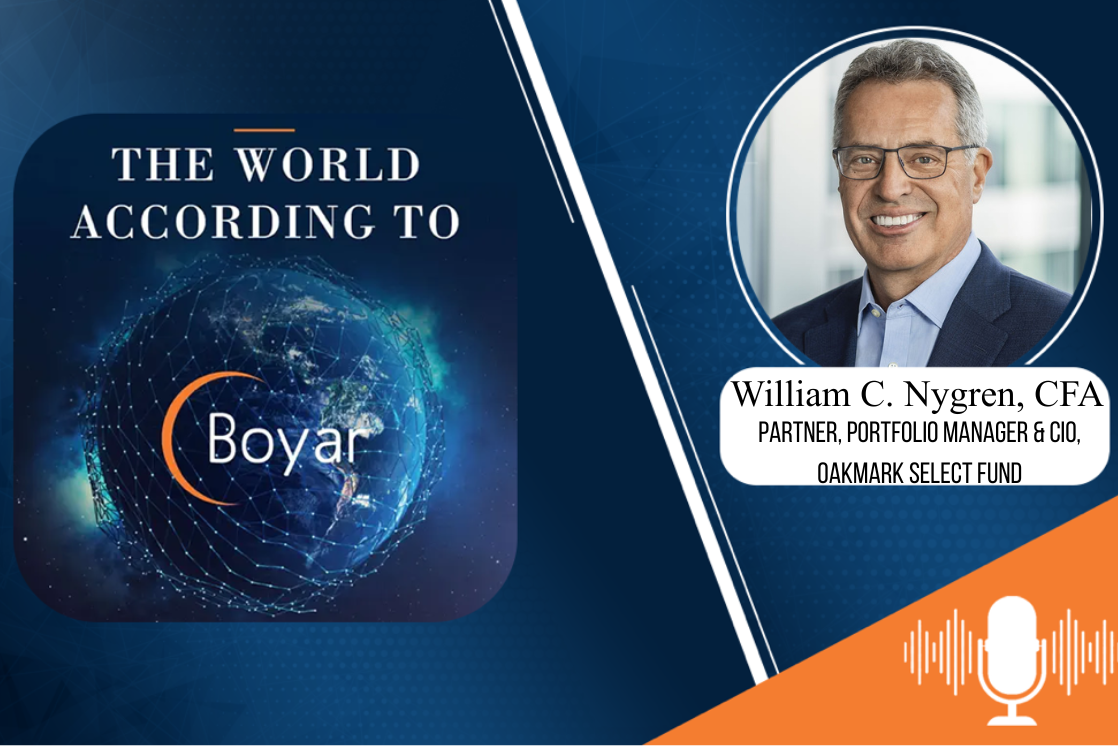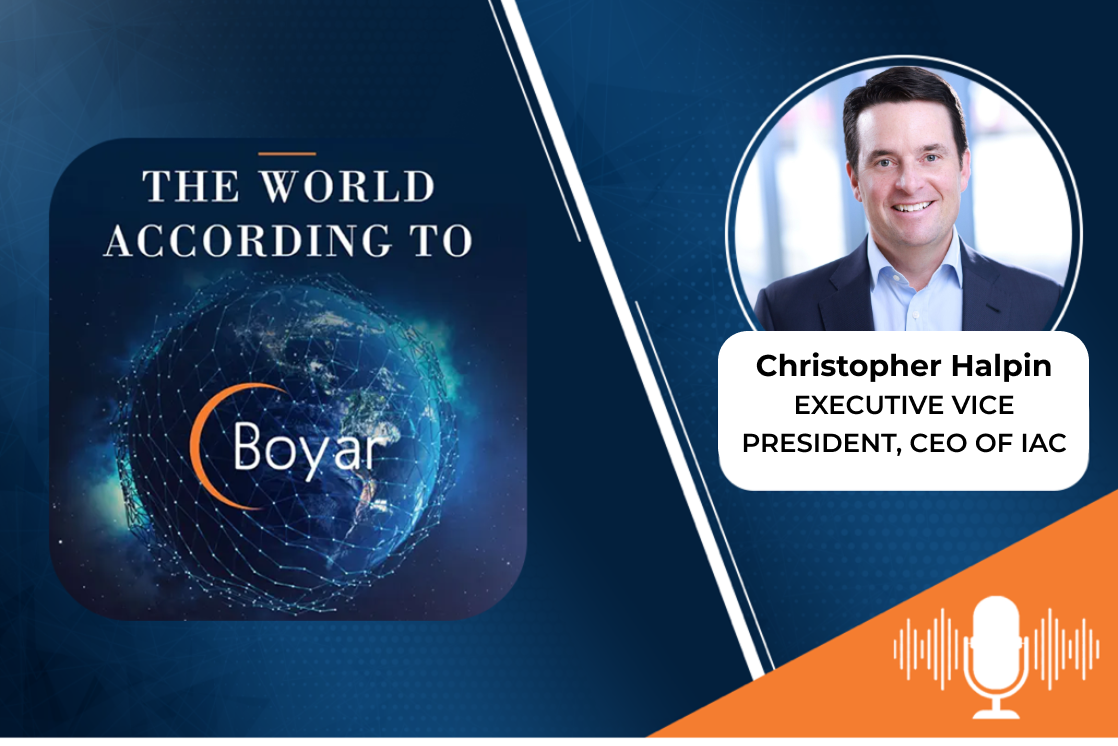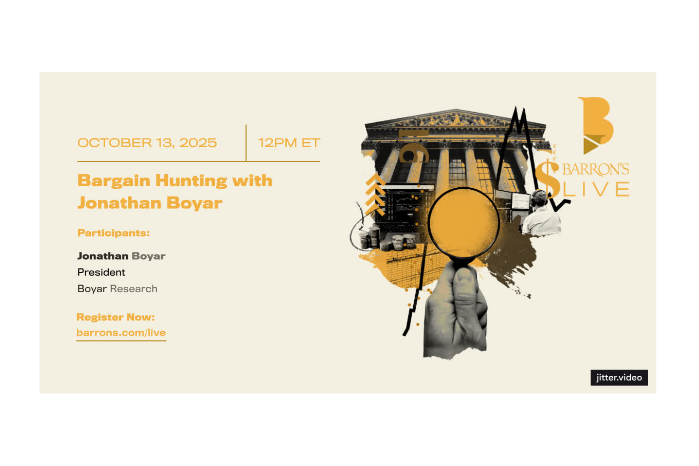Anthony Scaramucci on resiliency, cryptocurrencies, and much more.
Never miss another podcast. Click here to subscribe today to Boyar’s Substack and get all the new podcasts sent straight to your inbox.
The Interview Discusses:
- Anthony’s amazing life story growing up from humble beginnings to becoming a major success on Wall Street.
- His theory on resiliency and how he was able to recover after being fired from both Goldman Sachs and the White House.
- Why he is investing in cryptocurrencies.
- How Bill Miller influenced his investment decision making
- How Warren Buffett cost him a lot of money
- His support of Israel
- And much more!
About Anthony Scaramucci:
Anthony Scaramucci is the founder and managing partner of SkyBridge, a global alternative investment firm, and founder and chairman of SALT, a global thought leadership forum and venture studio.
Prior to founding SkyBridge in 2005, Scaramucci co-founded investment partnership Oscar Capital Management, which was sold to Neuberger Berman in 2001. Earlier, he worked in Private Wealth Management at Goldman Sachs & Co.
Scaramucci served on President Donald J. Trump’s 16-person Presidential Transition Team Executive Committee, and in 2017 briefly served as Chief Strategy Officer of the Export-Import (EXIM) Bank and White House Communications Director. Scaramucci, a native of Long Island, New York, holds a Bachelor of Arts degree in Economics from Tufts University and a Juris Doctor from Harvard Law School.
Click Below to Read the Interview Transcript
Transcript of the Interview With Anthony Scaramucci:
Jonathan Boyar (00:05)
Welcome to the World According to Boyar, where we bring top investors, bestselling authors, and business leaders to show you the smartest ways to uncover value in the stock market. I'm your host, Jonathan Boyar. I'm really excited about today's special guest, Anthony Scaramucci, founder and managing partner of SkyBridge, a global alternative investment firm, as well as founder and chairman of SALT, a global thought leadership forum. Prior to founding SkyBridge in 2005, Scaramucci co-founded investment partnership, Oscar Capital Management, which was sold to Neuberger Berman. In 2001, Anthony also served on President Donald Trump's 16th presidential transition team, and in 2017, briefly served as White House Communications Director. Anthony, welcome to the show.
Anthony Scaramucci (00:50):
You didn't mention I got fired from the White House, though. Are you just a polite person, or is it the holiday season, or what is it?
Boyar (00:57):
I figure it's not a great way to start the interview. That was question four.
Scaramucci (01:01):
No, I think so. I We could start right there, man. Boom. I got fired from the White House. Hopefully we'll get to 2022 where I think three or four financial news publications had written my financial obituary.
Boyar (01:14):
I actually had the words financial obituary written here as a question about the media and wanted to get your perspective on that. They love to pull people up, tear people down. Your case in point, they were writing your financial obituary.
Scaramucci (01:28):
Listen, some of them are writing positive things and who care. I mean, here's the thing. For your listeners and your viewers, what other people think of you as none of your business, especially if you're an entrepreneur, you gotta break eggs. You gotta push, you gotta not allow other people to infect your thought process. And so I've been fired from the White House. Actually, I got fired from Goldman. Did you know that, Jonathan? That was an another big firing of mine.
Boyar (01:52):
I don't think it was technically fired. You got rehired?
Scaramucci (01:55):
Yeah, but I got fired. I got an $11,000 severance check. One of the funniest things that ever happened to me was the woman in personnel. She was like, how are you? Great news that you're getting rehired into the securities division. I said, yes, it really is. She was, it's great. She goes, can I get the $11,000 check back, please? I was like, no, actually. She said, we won't have to tell anybody you've been fired. We can always just say that you were departmentally transferred. I said, Josephine, you can tell the whole world I got fired. I don't care. Okay, I'm keeping the check. I needed the money, Jonathan. I had no money at the time, but any event, she marked me down as departmentally transferred. Anyway, she was very nice, but it's fine. Look, when you hear a couple lessons for your viewers, okay, you get fired.
Take it like a man or a woman. Be nice to the person that fired you, because trust me, it's hard to fire people. I've had to fire people and it sucks. And I became best friends with the person that hired me. He's a 25, 30 year friend. Now, general Kelly fired me in the White House. His first official act was to bring me into his office and say, you go shook his hand. I said, John, I hope we can stay friends. Of course we did. We go on speaking tours together around the country and the world. Be nice to people and don't take it too personally.
Boyar (03:09):
You're talking a lot about resiliency too, because as an entrepreneur, you're coming back from these things and you've had, as you mentioned, some really high profile failures, which is the cost of being in the arena as Roosevelt Theodore, not FDR would say. But you bounce back. Why can you do it and others can't?
Scaramucci (03:27):
Others can. This is a decision that you have to make in your brain. This is a, certain switches have to be shut off in your brain, and other switches have to be switched on. So the first switch that has to be shut off is the self-conscious switch, and everybody has that switch. And somebody that tells you they don't have that switch, they're lying to you. The first time I was on television, I was very nervous. I was incredibly self-conscious, and I was very afraid of what people were gonna say or think of me after I left the studio the first time, I gave a public speech more than 30 people. My heart was thumping. So people that tell you that they're not self-conscious or they don't get nervous, stuff like that. Maybe today, 10,000 plus hours. 20 plus thousand hours of public speaking. I'm not nervous, but I was nervous.
(04:17)
When you're failing, it sucks. Okay? You want to have a bad day description. How about July 31st, 2017, I'm fired from the White House. I'm blown into Pennsylvania Avenue. I'm skinned alive by media pundits, cable pundits, late night comedy comedians. I'm skinned alive, and then rolled in Margarita Salt. Okay? It's a bad day. People said, I could never come back from that, and blah, blah, blah, blah, blah. Okay? So you just have to make a decision. You shut off the switches of self-consciousness in your brain. You don't take it personally. You have to say things to yourself like, Hey, you're gonna be dead. Before you know it. There's what Charles Al said is true. There are graveyards filled with men who once thought they were indispensable. Now they're gone. Or what? Mel Brooks says, 96 years young, relax, none of us are getting out of here alive. And so you have to put the whole thing in perspective.
(05:12):
Self-Conscious switches go down, and then passion switches go on, determination switches, go on testing switches. This is a test for me. Can I get through this? Can I succeed at this? You see what I'm saying? And if you can do that, then you're in the game. Now you're moving, now you're moving, and then you come up with ideas. You come up with strategies, and you keep moving. You don't give up. I had a crisis communications person that gave me the same advice that they gave Billy Bush, run, get under the desk, hide, can't be seen or heard from Now that this happened to you. I was like, I'm not doing that. I went on Stephen Colbert. The guy asked me how long I thought I was gonna last in the White House. I said, well, geez, I thought it was gonna last longer than a carton of milk and in the refrigerator.
(05:56):
I think it was gonna get blown out before the milk boiled. And then I said, you know what? We're gonna turn this into a unit of time, 11 days. So prime Minister Truss, she lasted 4.1 Scaramucci, speaker of the House, Kevin McCarthy, 24.5 Scaramucci. The guys in New Orleans podcast are like measuring people's tenure now in Scaramucci. So a big shout out to David Sachs for doing that. For me, what I'm making is that you can either roll with it and lean into it, or you disappear. And I don't think you should disappear. And you've got entrepreneurs, financial advisors, managers, people that are listening. Nobody escapes the trials and tribulations of life. Nobody, I don't care if you're a billionaire. You have people in your family that are not well. Life has comedy in it, and it has tragedy. The ancient Greeks understood that you are all, we're all together in the human condition faced with whatever it is, okay?
(06:53):
Unfortunately, this year, I lost my dad. He was 88. He died in September. Very hardworking man. A miracle actually that he made it to 88 'cause he was a chain smoker until he was 50. A scotch drinker, a crane operator, a hard, tough guy, but a good man, a very hardworking person, but he died and everybody dies. God bats a thousand, or the universe bats a thousand. So what are you gonna do? You have to live with inside of the rules of life. You can't get agitated at life or bitter if these things are happening. If you're an entrepreneur, you're taking risks. You're gonna have setbacks and failures.
Boyar (07:30):
Failure. Sorry to hear about your dad. And I was listening to some of the podcasts, and I heard an unbelievable story. You told about him, where you were thinking about wanting to go to college. You went to Shreiber High School, you had modest means. You got into Tufts, which is obviously a great school. It was $24,000 a year, and he did something unbelievably generous. I don't know if you can tell us. What he did was listening to it last night, and I couldn't believe it.
Scaramucci (07:55):
We're talking about my dad with the life insurance, right?
Boyar (07:58):
Yeah.
Scaramucci (07:59):
That was a big day for me. Everybody has a seminal moment in their life or an epiphany. So I was somewhat wayward in school, decent athlete, high test scores. And I had gotten myself into Tufts University. And this is part of the stories. I'm gonna share it with you, A gentleman who's now deceased, his name is John Zanetti. He was my guidance counselor in high school. He spoke fluent Italian. I got into Binghamton, which is a state university, a phenomenal school, by the way. Several of my partners at SkyBridge went there. Blue collar kids that went to Binghamton. And Mr. Zanetti came to my parents' home. He had a small house out here on Long Island. He had a couple of espresso with my parents, and he spoke to them in Italian. And he told them, I want Anthony to go to the private school, let him go to the private school up in Boston.
(08:45):
It'll make him more worldly. It'll give him a leg up. It'll be a difficult adjustment for him. And even though one was like three or 4,000 for the year, the other was 24,000. He's like, you gotta do this. He'll figure it out. He'll take loans, he'll pay for it, blah, blah, blah. So my father, the house filled with smoke listening to the whole thing, said, okay, yeah, no problem. Let me think about it. And about a week later, he handed me a check for $10,000. And I said, dad, what is this? He said, my union had this life insurance policy. I was giving premium to withdrawals from my checking account. This is the cash value of the policy. So he cashed out the policy, took the cash today, eliminated the life insurance benefit, and handed me the $10,000 check. And he said, listen, that's really all I got.
(09:33):
Get you started. I'll give you money from time to time, spending money, petty money, things like that. But this is really what I got to get you started. And I remember taking the check, I remember looking at it. I said, dad, you gave up your life insurance. Wow. Yeah, it's more important. And it was a seminal moment because let's face it, we all have our moments of laziness. We all have our moments of, okay, I'm just gonna meander through this. And that was me in high school. And we handed me that check. I was like, okay, I can't let my parents down. Okay? They want me to do well in school, and they want me to try to get to a higher aspiration than they got to. And I got not gonna let 'em down. When I got to Tufts, I went to work not only academically, but I was delivering pizzas.
(10:13):
I was selling T-shirts, I was delivering newspapers. I worked in the economics department for a statistician. And then I got really lucky. I had very high LSAT scores. This is going into my junior year. And so I got hired as a Stanley Kaplan tutor, which was phenomenal. That was like $22 an hour back in the eighties, okay? And I was like, okay, great. So every night I was driving over to Wellesley and Newton, to the Stanley Kaplan offices, and I was teaching people test taking techniques and had to think about the lsat, right? 'cause I had done well. And so anyway, I'm probably being too long-winded. But the point I'm making is that my old man was willing to give up and make a sacrifice to make my life better. I will always remember that. And sometimes I'm getting my ass kicked. If you're allowed to say that on this podcast, I think it, Hey, whatever you want.
(11:05):
He said to me, he had another great line I'll share with you. He said, Hey, I got the job at Goldman Sachs. My parents had no idea, okay? In fact, when I told my mother, it wasn't a law firm, she was pissed at me. And so she was like, you went to law school. How could you not be a lawyer? Are you sure you're making the right judgment? And I remember I was like in Rosanna's Deli in Port Washington where I grew up, and I was ordering myself a hero. And Mrs. Campanelli said to me, how's that law firm, Goldman and Sachs? Your mother says, you're doing really well there. I said, excuse me? She said, yeah, the law firm, Goldman and Sachs, these people had no idea, right? They were reading like El Progresso, the Italian language newspaper, right? I looked at it, I said, so Mrs. Campanelli, the law firm, Goldman Sachs said, yeah, your mother told me about it. I said, went to my mother's house. I said, ma, are you telling people in the neighborhood that I'm working at a law firm? She goes, yes, I am. I'm embarrassed that you're not a lawyer. She was talking to me. So just giving you a sense for like the family I grew up in, right? And she's 86 years young. God bless her. So she'll remember that story. She also thought I was going to Hartford Law School. So she had the map out, said, we're going to Connecticut. I said, no, we're going to Harvard. We're not going to, it's not Hartford Law School. No, ma, it's in Boston. It's by Tufts. This is the people I grew up with. Okay? So I wanna frame it for you how big of an adjustment it was from going from a blue collar neighborhood into white collar Wall Street.
(12:20):
But my dad said something I'll never forget. I got the job, I was ready to start work. My father said, Hey, you know, I never want to hear you complain about your job, ever. And I said, what do you mean pops? He said, first off, it's indoors. It's out of direct sunlight, and there's no heavy lifting. Okay? And so how can you complain about a job like that? And so whether it was the financial crisis, the David Asin crisis of 94, the long-term capital management crisis of 98, 2008, which I just mentioned, whatever it was, I used to always think about what my dad said. Okay, we're indoors. We're not gonna miss a meal. My net worth is down. Big deal. We'll figure it out. Okay? So it's expectations too.
Promotional Message (13:00):
We at Boyar Research, hope you're enjoying the show. I like to take a few moments to tell you about our latest offering. Traditionally due to its price point, our research has been available predominantly to large investment firms and family offices with considerable assets under management. We made a move to lower that barrier to entry by introducing our newest research product, Boyar Research on Substack. Now you can receive some of the same great investment ideas and the in-depth research that accompanies them for a fraction of our institutional pricing. 12 companies a year, each of them with a catalyst we see propelling their stock price to appreciate in value in coming years. And hundreds of hours of research and analysis all delivered straight to your inbox. Find us on Substack at for your research dos substack.com to learn more.
Boyar (13:54):
Switching gears a bit, you're a vocal proponent of crypto. I'm a fundamental value guy, and I just don't get it. And I put it in the too hard to analyze pile. But when I see people like Bill Miller, who I have a lot of respect for investing in it and being a crypto bull, what's the fundamental reason to own crypto?
Scaramucci (14:16):
Let's go to investment philosophy for a second. Okay? So let's talk about buffet for a second. 'cause We both have probably studied him. He was a half a cigar butt investor, okay? So if the butt was on the floor and it was worth $2, he was gonna buy it for a dollar. He'd pick up the cigar butt and smoke the last couple puffs. That's an analogy he's always used. And that was from his mentor, Benjamin Graham. When Buffet met Munger, he got heavily influenced by Ken Fisher's father, Phil Fisher. Okay? So we're giving a little bit of history lesson here. And Phil Fisher was a growth stock investor. So Phil Fisher said, okay, that's an interesting way to invest. It's probably safer, but I would like to buy companies that have meaningful growth. So if I buy Apple computer at a hundred million dollars, so let's say a hundred billion dollars market cap, it looks like the valuation is too high, but it's growth rate is so high that in three or four years, my end price is gonna be a low pe.
(15:14):
So I'm willing to accept that. And it took Buffet a while to get there, okay? And once he got there, he got very comfortable. And lo and behold, Berkshire Hathaway, which has had one of the most spectacular investment performances ever, when I started in this business known as Wall Street in 1988, Berkshire Hathaway's, a shares were 4,300. Today, I think they're like 540,000. So I'm just gonna give you a sense for the staggering returns due to this thinking and this discipline. And I'm sure this is a discipline that you and your team aspire to, but he transitioned, okay? And now there's another moment. So somebody like Bill Miller has been influenced by Phil Fisher, and he is also been influenced by the venture capitalists and the technologists that he's associated with. And so we were all at the Allen and Company conference in 2000, the Allen and Company Media Conference, a gentleman by the name of Jeff Bezos gave a presentation.
(16:12):
And Jeff said, people are saying that I'm losing money and so forth, but lemme explain to you what I'm doing. And I've got these books that I'm selling. You guys have me as an internet book seller. You see the size of these books. These books are roughly the same size, right? And so I can ship these things around the world easily, and it's helping me reverse engineer and DOPP plot my warehouses. A result of which, when I turned the spigot on, I'm gonna make a fortune. But this is a 10 year project. I wrote it all down. I said, this guy's a genius. I gotta own some of the stock. Okay? And I made a terrible mistake because the next guy speaking was Warren Buffett. And Mr. Buffett said, yeah, that's a very nice young man, Jeff Bezos, but he's losing money. And could you believe the valuation of his company is larger than Sears?
(16:56):
Uck the most storied retailer in the world, and Sears has all of this great real estate. This guy has no real estate. And he's got a website. And yeah, great, great, great. I'm not buying it. Bill Miller loaded the truck on Amazon, okay? And Bill Miller loaded the truck on Amazon because he saw through technological advancement, the digital scaling of that business, and the lack of bricks and mortar expenses associated with that business and the digital scaling. Now, at 37, when I heard the pitch, or 36, I wasn't comfortable with it because Mr. Buffett was my disciple. I was his disciple, even though he didn't know me, two or three pictures with him. But intellectually, I was mentored by him. Okay? But Bill Miller saw it. I didn't have the guts, okay? So I said to myself, I've gotta get more in the zone of Bill Miller.
(17:45):
I gotta start thinking more like him. So when the digital assets came before me in the Saul Conference, and the Winklevoss twins came to me and they said 2014, what it was, I laughed. I said, I don't understand. This is a complete bullshit. And then I put out some kind of tweet, which everyone has a tweet for everything. I said, Bitcoin, I have no idea what it is, and I don't care. Caveat mTOR, it seems senseless. It's a crypto graph on the internet that someone's ascribing a value to. How could that be worth anything? And then somebody handed me a book from Neil Ferguson called The Ascent of Money. And then I watched the BBC documentary and Professor Ferguson as a friend of mine, and I read the book, and I started ticking off the things that makes money, ticking them off. And I said, okay, this is really makes sense to me that I now have an understanding of why seashells are worth something.
(18:42):
I have an understanding why I have a piece of fabric known as a dollar bill or a hundred dollars bill in my trouser pocket. It's worth something. Okay? It is a piece of linen and cotton. Go look it up. How do we make bills? 75% cotton, 25% linen? But if I hold it up and I ask you and undergrad philosophy is worth anything, no. But if I give it to the usher, if I give it to the maitre d, they're very happy because there's a trust associated with it. And so what you are missing, what you need to get an understanding of quickly, if you want to participate, and if you don't wanna participate, that's fine, because there's plenty of fish in the sea. But if you want to get it, tick off the things that make money, tick off the things that made a seashell money, a gold coin, money, gold itself, a store of value.
(19:30):
And lo and behold, you'll find that something like Bitcoin has every one of those things, and it's transportable and it's easy to move. Last point is the blockchain. To understand the blockchain, you need to understand that that's a massive de layering mechanism. It'll take out intermediaries people don't like and they don't trust each other, Jonathan. That's why we always have third parties to do transactions. You're gonna sell me your house. You're gonna send me the corresponding bank wiring instructions. I'm gonna wire from my bank to your bank. Your bank's gonna call you and say, Hey, Scaramucci, money's in your account, then you're gonna hand me the deeded. But the blockchain is this wonderful, fully transparent, fully distributed mechanism that allows you to transfer value between you and me without a third party. When you understand that it's going to unleash and it will continue to unleash great technological innovation, and it will reduce costs.
(20:24):
And that's what technology is supposed to do. Improve the quality of your life, reduce costs. We could not do this cell phone call in Web one nineteen ninety eight. Couldn't do it, but we can do it today. We're like George Jetson talking to each other, okay? And you have to see the future where the blockchain is going to change the way we transact with each other. Okay? You come to my restaurant, the Hunt and Fish Club, someday you're gonna pay with a stable coin over the blockchain. We're both gonna avoid the three point half percent service charge from the credit card the same way. Now we make costless phone calls to Europe when they cost $3 a minute, 35 years ago. So I'm being long-winded, but I need you to get intellectually adapt, and I need you to expand the bandwidth of your thought process. How could a guy like me age 60, starting with Warren Buffet and ascribing to all of his philosophy, graduating to Phil Fisher and Charlie Munger, how could I be with Bill Miller and Bitcoin? How could I be with Bill Miller? Okay. And the answer is that evolution of thought
Boyar (21:25):
Pushing. Just back on the Amazon example, 'cause you're picking the winner of the two thousand.com bust. You could have bought almost everything else and lost money at Jeff Bezos was the guy. He had the vision. How do you pick the winner in crypto if there will be a winner? You thought you had found it, obviously with SPF lesson learned. How do you find that winner in that analogy?
Scaramucci (21:53):
So it's a really good question. If I had that answer, I would be worth 20 or $30 billion. I obviously don't have that answer. So all I can tell you is you have to make a lot of different betts, and then you have to hope that one or two of those work out. And so the space for something like Bitcoin in my portfolio is small, okay? I'm an advocate of it. And so that's why I've been labeled by the media as a Bitcoin, but it's small, it now, it's becoming large because of appreciation. So if you put a 5% position on in Bitcoin, it goes up four to one. You got a 20% position in your portfolio, then you have to make a decision if you wanna hive it off or not. But my point is, there should be space in your portfolio, one, two, 3%, 4%, where you're going to invest in things that may be off the grid.
(22:43):
Why? It'll make you smarter. You'll likely lose on a lot of those investments, and that will make you even smarter because you're learning more when you're losing or when you're failing than when you're winning. Okay? Winning creates hubris and winning creates arrogance. Losing creates a teaching moment and humility, okay? A lot of times when I'm winning, I'm reminded of what the ancient Romans did to their emperors when they came back and they did a triumph. They put the emperor in the chariot and they threw laurels at him. But there was a slave in the chariot with him whispering in his ear, you are mortal, you will die. Okay? Not to get overly feathery in your brain, stay grounded. Okay? But a couple of percent here or there, I can name 20 things I missed, 15 things I lost money on. You know, I have a buddy of mine that's on the board, very close friend.
(23:36):
He's on the board of SpaceX and Tesla, okay? His name is Antonio Rossius. If he listens to your podcast, he'll laugh. He came to me 20 plus ago, and I have this genius friend named Elon Musk. I bought some PayPal privately, and he's my genius friend. I wanna introduce you to him and I want you to invest in his new companies. He said, wait, what is he doing? He's starting a commercial space company, but at the same time he's doing that. He's just acquired this electric car company. He's gonna do both of these things at the same time. And I'm an investor in both I, excuse me. Okay? And so, Mr. Idiot, I passed on those. Antonio went on to become a billionaire. He's on the board of both of those companies. Okay? So you're gonna miss things, okay? And, but you gotta be a happy warrior as an investor, you gotta say, okay, I got that wrong. Let me see if I can take some risk and be more open-minded next time
Boyar (24:29):
I, I know we're running out of time. I just wanted to end this by actually thanking you. On social media and in the media in general, you've been in outspoken supporter of Israel, very much so in their fight against Hamas. Unfortunately, that type of public advocacy's rare, especially for those outside of the Jewish faith, one, thank you. But two, why be so public on it? 'cause It doesn't help you.
Scaramucci (24:53):
Look, a lot of the things I do publicly does not help my business. Michael Jordan had a great line. I'm not taking a position for Republicans buy sneakers. So do Democrats taking no political positions. I'm here to sell sneakers, but then you don't really have any effect of change in a society. Okay? When I got into Bitcoin, a lot of people said to me, be quiet about it. If it doesn't work, you'll be humiliated. Of course it wasn't working. And I think they had me sinking in the Bitcoin boat on the front page of the near post business section. But we got there three years ahead of BlackRock and we're one of the first investors in the BlackRock trust that's about to be converted into the ETF. I think you have to take positions in life, even if it costs you money. And even if you get things wrong, you have to take positions in life.
(25:37):
I see the Israeli situation with great clarity. Does Israel have the right to exist or does it not? The United States made a decision in 1947 alongside of the UN that it does have the right to exist. Therefore, does Israel have the right to defend itself when people are crossing its border and murdering 1300 innocents, raping people and bringing 10 month olds and 80 plus year olds back into their area and holding them as hostages? Does Israel have the right to go and protect those people? And the answer to that is yes. Now there's great casualty and there's great civilian casualties that are going on that I find tragic. And I'm watching CNN like you are other news outlets. And I see people in the Gaza Strip, which I have visited, believe it or not, I've been to Sta Road, I've also been to the Raffa Gate, I've been to Gaza.
(26:31):
And I see that with great tragedy. And I do believe that are innocent people that live in the Gaza Strip. They're not all terrorists and all of that demonization does not work for me. But does Israel have the right to exist? Yes or no? The answer to me is yes. Is there been systemic 5,000 years worth of antisemitism in our society? The answer is yes. Now, I didn't think we'd see it pop its head up like this ugly head in my lifetime after the atrocities of the Holocaust, which are 80 short years ago. I didn't see that. Okay? And so therefore, I have to speak out against it because otherwise, if you don't, you're creating space for people to demonize a sect of people that are innocent like everybody else. Okay? And I'll make this point, Sheldon Adelson invited me when I got my ass fired from the White House.
(27:21):
He invited me to be the keynote speaker at the Republican Jewish Coalition in November of 2017. I think we had the Israeli ambassador there. I got up there, I, I looked at the list of Jews. I said, what's going on here? There were no Jews available to give this speech. You had to have a token. Go give the speech. The whole place went crazy. And then I said, lemme tell you something. I'm gonna talk to you as a non-Jew about Jews, and you should pay attention to me. 'cause I grew up in a Jewish neighborhood. Italians, Jews, Irish probably been to more bar mitzvahs than christenings. Now let me explain something, okay? You guys have punched over your way for 5,000 years. But the entire western canon of liberalism, the entire western canon of freedom has come from the Torah study, the Torah. It goes right back to the foundation stone, which the dome of the rock is on now.
(28:10):
But that was the original temple. And it goes back to the tiki ancient teachings of the Torah. The 10 Commandments, et cetera, are the bedrock of our laws. They're the bedrock of our liberty. They, they move their way into Athens, out of Athens, into Rome, Rome, into the French Republic, out to the United Kingdom, and its constitutional monarchy and into the United States. It's republic. And if you study it, it all comes from the thinking of the ancient Jewish people. And so I stand here before you to tell you, that's the first domino. If that domino falls, okay, you're taking out freedom in our society. This idea of freedom is only a couple thousand years old. And this idea of western liberal democracy where we can coexist despite our religious thoughts and despite our differences of opinion, okay? Is the thing that has awakened the society. And it's created all this economic innovation and growth.
(29:07):
If you live in a tyranny or you live in an autocracy, people at the top get rich and everybody else suffers. And the number one reason why is you lose the predictability and the sanctity of law. And we don't have that yet in this society. And we need to fight against that. And the first domino, okay, and I don't say this to you because you're a Jew, I say it because I believe it in my heart and soul. The first domino is that, and when that domino falls, whether you're Italian Irish, you pick the sect that you think you're in, that you're protected, you're not. They're coming for you. Okay? The first domino is the Jew, and then the next domino falls. And the next domino falls. And before you know it, like two thirds of this planet, you're living in a dictatorship or an autocracy.
(29:52):
And where people are allowed to be scapegoated for no other reason than the fact that they may practice a different religion than you. Last point. 'cause I know we're an ot, but this is an important point. The Jews have done well, okay? Now, I'm not saying every Jew has done well, and I'm not trying to be stereotypical, but they have done well. It is a culture of success. They teach their kids to study, they have a culture of success, and there's lots of jealousy associated with that, okay? And don't forget that I'm asking people to see through that, and I'm asking people to speak out against it. Because if you don't do that, you are threatening the entire system. And this system has made many of us very successful. This has been a wonderfully aspirational system. We went from a family of peasants and coal miners to Wall Street, and we did it in one generation. And you don't do that in tyranny. You don't do that in aristocrats. You do that in Western flat liberal democracies.
Boyar (30:50):
Anthony, you've been unbelievably generous with your time. As you said, we're in overtime and I know you have stuff to do. So thank you for appearing on the world according to Boyar, and thank you for your time.
Scaramucci (31:00):
Hey, I appreciate being on, sir, and you have a great, happy holiday.
Boyar (31:04):
I hope you enjoyed the show. To be sure you never miss another World According to Boyar episode, please follow us on Twitter @boyarvalue. Until next time.
Never miss another podcast click here to subscribe today!
Available wherever you download podcasts:
About The Boyar Family Of Companies
Boyar Asset Management
We have been managing money since 1983 utilizing our proprietary in-house value-oriented equity strategies. We manage money for high net worth individuals and institutions via separately managed accounts. To find out how we can help you with your money management needs please click here
Boyar Research
Since 1975 we have been producing independent research on intrinsically undervalued companies across the market capitalization spectrum and in a wide variety of industries using a business person’s approach to stock market investing. To find out how we can help you with your research needs please click here












